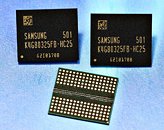- Joined
- Oct 9, 2007
- Messages
- 47,235 (7.55/day)
- Location
- Hyderabad, India
| System Name | RBMK-1000 |
|---|---|
| Processor | AMD Ryzen 7 5700G |
| Motherboard | ASUS ROG Strix B450-E Gaming |
| Cooling | DeepCool Gammax L240 V2 |
| Memory | 2x 8GB G.Skill Sniper X |
| Video Card(s) | Palit GeForce RTX 2080 SUPER GameRock |
| Storage | Western Digital Black NVMe 512GB |
| Display(s) | BenQ 1440p 60 Hz 27-inch |
| Case | Corsair Carbide 100R |
| Audio Device(s) | ASUS SupremeFX S1220A |
| Power Supply | Cooler Master MWE Gold 650W |
| Mouse | ASUS ROG Strix Impact |
| Keyboard | Gamdias Hermes E2 |
| Software | Windows 11 Pro |
Samsung Electronics Co., Ltd., the world leader in advanced memory technology, announced today that it has begun mass producing the industry's first 8 gigabit (Gb) GDDR5 DRAM, based on the company's leading-edge 20-nanometer (nm) process technology. GDDR5 is the most widely used discrete graphics memory in the world.
Designed for use in graphics cards for PCs and supercomputing applications, and on-board graphics memory for game consoles and notebook PCs, discrete graphics DRAM provides an extensive amount of bandwidth to process large high quality graphically-oriented data streams. With the rising popularity of 3-D games and UHD video content soon to be widespread, the need for high-performance, high-bandwidth graphics memory has begun to rapidly increase.

"We expect that our 8Gb GDDR5 will provide original equipment manufacturers (OEMs) with the best graphics memory solution available for game consoles as well as general use notebook PCs," said Joo Sun Choi, Executive Vice president of Memory Sales and Marketing at Samsung Electronics. "By expanding our production of 20nm-based DRAM products including the new GDDR5, we will meet increasing global customer demand and take the lead in accelerating the growth of the premium memory market."
Samsung's new GDDR5 DRAM offers outstanding bandwidth. Combining only eight of the new 8Gb chips will achieve the same density as the 8 gigabytes (GB) needed in the latest game consoles.
The memory operates with an I/O data rate of 8 gigabits per second (Gbps) per pin, which is more than four times faster than the DDR3 DRAM widely used in notebook PCs today, and each chip can process data at 32-bit I/O rate. Two GB of graphics memory can be created with just two of the new chips, which together can process up to 64GB of graphical images per second. That equates to processing approximately 12 full-HD DVDs (5GB equivalent) in a second.
With this new 20nm 8Gb GDDR5, Samsung has completed its line-up of 8Gb DRAM solutions based on its leading-edge 20nm process technology, covering the server, PC, mobile and graphics memory markets. The world's largest memory manufacturer will keep expanding the production volumes of its 20nm DRAM products at a variety of densities including 4Gb, 6Gb, 8Gb and higher densities to solidify its leading position in high-end IT market segments as well as more value-driven markets.
View at TechPowerUp Main Site
Designed for use in graphics cards for PCs and supercomputing applications, and on-board graphics memory for game consoles and notebook PCs, discrete graphics DRAM provides an extensive amount of bandwidth to process large high quality graphically-oriented data streams. With the rising popularity of 3-D games and UHD video content soon to be widespread, the need for high-performance, high-bandwidth graphics memory has begun to rapidly increase.

"We expect that our 8Gb GDDR5 will provide original equipment manufacturers (OEMs) with the best graphics memory solution available for game consoles as well as general use notebook PCs," said Joo Sun Choi, Executive Vice president of Memory Sales and Marketing at Samsung Electronics. "By expanding our production of 20nm-based DRAM products including the new GDDR5, we will meet increasing global customer demand and take the lead in accelerating the growth of the premium memory market."
Samsung's new GDDR5 DRAM offers outstanding bandwidth. Combining only eight of the new 8Gb chips will achieve the same density as the 8 gigabytes (GB) needed in the latest game consoles.
The memory operates with an I/O data rate of 8 gigabits per second (Gbps) per pin, which is more than four times faster than the DDR3 DRAM widely used in notebook PCs today, and each chip can process data at 32-bit I/O rate. Two GB of graphics memory can be created with just two of the new chips, which together can process up to 64GB of graphical images per second. That equates to processing approximately 12 full-HD DVDs (5GB equivalent) in a second.
With this new 20nm 8Gb GDDR5, Samsung has completed its line-up of 8Gb DRAM solutions based on its leading-edge 20nm process technology, covering the server, PC, mobile and graphics memory markets. The world's largest memory manufacturer will keep expanding the production volumes of its 20nm DRAM products at a variety of densities including 4Gb, 6Gb, 8Gb and higher densities to solidify its leading position in high-end IT market segments as well as more value-driven markets.
View at TechPowerUp Main Site






